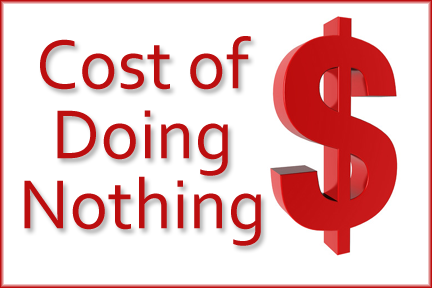 It’s always wise to count the cost of a project, against the cost of doing nothing!
It’s always wise to count the cost of a project, against the cost of doing nothing!
Has this ever happened to you? You failed to act on something at the right time and the lesson was severe. If you could go back, would you make the same decision, to do NOTHING?
Procrastination is a paralyzing quandary that many of us deal with on a daily basis in business. It’s easy to become sidetracked, even immobilized, choosing to deal with non-essentials that require little commitment or perseverance.
Doing NOTHING allows us to avoid opposition or confrontation; however, the cost of that will come later!
Who wants to hear the word “No,” from co-workers? Who wants to risk (heaven forbid!) not being “liked,” when meeting a problem head-on?
Confronting or Avoiding Problems
As an owner or manager, it’s always more comfortable to talk with people who “love” hearing from you. You might think those can be more easily won over to your way of thinking. Moreover, it might seem simpler to just close your office door and shut out all the daily hassles. But, it’s necessary to confront and hold accountable those who make continuous errors that disrupt production for everyone. It’s part of the deal, as a leader!
We ALL want to be liked. In fact, we can do the darnedest things to ensure we ARE liked. We will waste hours talking with vendors who “like” us (or rather, like our business). Conversely, we avoid dealing directly with difficult clients who want to know why mistakes are happening on their jobs.
LET’S FACE IT—being the head steward over a business is a challenge that has constant pressures and tough decisions that need to be made in order to maintain success.
What is the cost of doing nothing?
DOING, is what we must do—doing nothing is not an option! Implementing lean management, quality control and other systemic actions is imperative for a healthy, growing business.
Yet, I hear almost weekly from so-called decision makers of companies, that they can’t make a decision; not until they have a consensus among their employees. I’m always dumb-founded by that.
Of course, I’ve learned over time, what they are actually saying is, they have determined the cost is too high. It might take too much of their time. And they don’t want to risk a mutiny, if they require employees to adhere to certain standards. Many people balk at change that might take them out of their comfort zone, even if it’s detrimental to their business.
Truth is, rarely would company leadership get a 100% affirming consensus from any group of employees. Especially, on implementing a system that requires real accountability for their work, or that could potentially expose their shortcomings.
Many owners would rather cling to the politics of “business as usual” that just maintains the status quo, with all its woes. Trying to improve on that, I heard that voice in my own ear, years ago. It warned me that my decision to bring my business to order through a systemic approach would require real commitment, continuous positive actions, and my time. I might have given up on that idea then!
So, how will you answer that “voice?”
Some of the Cost of Doing NOTHING:
- The loss of good employees due to the stress of on-going internal chaos.
- Customers leave due to errors and late deliveries.
- Equipment breakdowns from poor maintenance, causing missed deadlines.
- Cluttered work areas resulting in poor performance and morale.
- Family heirs to the business opting out after years of watching their parents being overwhelmed and having no time for personal life, due to the disorganization.
- Unable to leave the office without your mobile phone constantly ringing, and operations falling apart.
- YOU will continue to eat the cost of other people’s mistakes and their fear of higher standards and accountability.
So, after counting the cost of doing NOTHING in my own business, I made a commitment to build an operations manual. I would include written business processes and standards, to eliminate internal chaos. That’s A PRICE I GLADLY PAID!
Now other businesses are able to benefit by the work we continue to do. Ultimately, the cost of EXCELLENCE is minimal, compared to the cost of doing NOTHING!
Did I mention? Great systems work!

Recent Comments